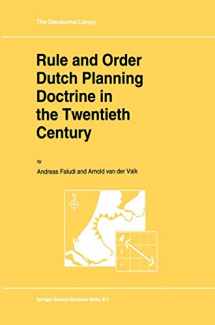
Rule and Order Dutch Planning Doctrine in the Twentieth Century (GeoJournal Library, 28)
Book details
Summary
Description
This book is about an art in which the Netherlands excels: strategic planning. Foreign observers will need little convincing of the merits of Dutch planning. They will want to know whether routine explanations (small country, industrious, disciplined people hardened by the perennial fight against the sea) hold any water, and they will want to know where to look for the bag of tricks of Dutch planners. Dutch readers need to be convinced first that planning in the Netherlands is indeed effective before contemplating how this has come about. Our message for both is that, to the extent that Dutch planners do live in what others are inclined to see as a planners' paradise, it is a paradise carefully constructed and maintained by the planners themselves. This smacks of Bernard Shaw describing a profession as a conspiracy against laity. However, all knowledge and all technologies are 'socially constructed', meaning that they are the products of people or groups pursuing often conflicting aims and coming to arrangements about what is to pass as 'true' and 'good'. So this takes away the odium of Dutch planners having their own agenda. Positioning ourselves We are in the business of interpreting Dutch planning, and at the same time committed to improving it. This makes us part of the situation which we describe. This situation is characterized by the existence of two divergent traditions, urban design and the social-science discipline called 'planologie'.


We would LOVE it if you could help us and other readers by reviewing the book
Book review



